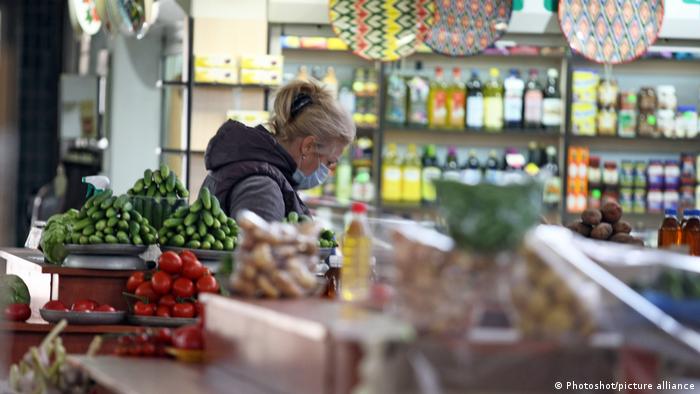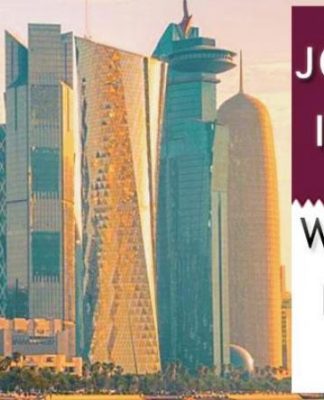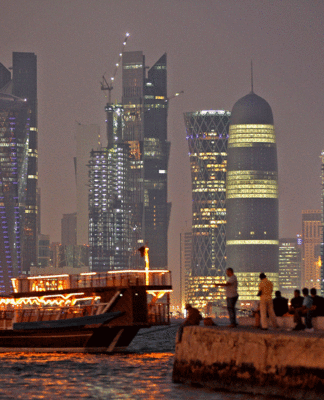IMF slashes global growth outlook amid Ukraine war
The negative economic effects from Russia’s invasion of Ukraine will significantly hurt global growth, the IMF has said. Increasing food and fuel prices have raised the prospect of unrest in poorer countries.
 The loss of Ukrainian and Russian food exports has resulted in soaring prices and fueled worries of global food security
The loss of Ukrainian and Russian food exports has resulted in soaring prices and fueled worries of global food security
The economic damage caused by Russia’s invasion of Ukraine will lead to a significant slowdown in global growth in 2022, the International Monetary Fund said in its latest update of the World Economic Outlook report released on Tuesday.
The global economy is now expected to grow 3.6%, down 0.8% from the fund’s January forecast, due to the war and its impact.
The Washington-based IMF expects both Russia and Ukraine to experience steep contractions this year, with spillover effects such as surging commodity prices affecting countries across the world. The report shows Ukraine suffering a 35% collapse of its economy, while Russia’s GDP will shrink 8.5%.
“The effects of the war will propagate far and wide, adding to price pressures and exacerbating significant policy challenges,” IMF chief economist Pierre-Olivier Gourinchas wrote in a blog post on April 19.
The European Union, which has been rocked by the Ukraine crisis, is projected to take a big economic hit, with the bloc’s growth outlook for this year revised downward by 1.1 percentage points.
“The main channel through which the war in Ukraine and sanctions on Russia affect the euro area economy is rising global energy prices and energy security,” the fund said. “Because they are net energy importers, higher global prices represent a negative terms-of-trade shock for most European countries, translating to lower output and higher inflation.”
Germany’s economy is now expected to expand only 2.1% this year, down from 3.8% previously, while Italy’s growth will be 2.3% compared to an earlier forecast of 3.8%.
Price surges and food insecurity
The IMF’s revision comes after a similar downgrade by the World Bank last week of its forecast for global growth this year, citing the war in Ukraine, inflation concerns and pandemic lockdowns in China.
The war has worsened the problem of inflation, with countries worldwide witnessing a surge in prices, especially for food and energy.
Russia and Ukraine are major producers and exporters of food and other commodities. The loss of their exports due to the war has resulted in soaring food prices and fueled worries about food security globally, especially in countries reliant on food imports.
“For 2022, inflation is projected at 5.7% in advanced economies and 8.7% in emerging market and developing economies — 1.8 and 2.8 percentage points higher than projected in January,” the IMF said, adding that inflation will likely remain elevated for longer than previously estimated.
High and persistent inflation could prompt key central banks like the US Federal Reserve to take more aggressive action to ensure price stability. That, in turn, is likely to raise borrowing costs worldwide, hampering economic recovery efforts, particularly in indebted developing countries.
“The risk is rising that inflation expectations drift away from central bank inflation targets, prompting a more aggressive tightening response from policymakers,” Gourinchas pointed out. “Furthermore, increases in food and fuel prices may also significantly increase the prospect of social unrest in poorer countries.”
China’s pandemic woes and supply chain bottlenecks
The Ukraine conflict also “adds to the economic strains wrought by the pandemic,” the IMF said.
“Although many parts of the world appear to be moving past the acute phase of the COVID-19 crisis, deaths remain high, especially among the unvaccinated. Moreover, recent lockdowns in key manufacturing and trade hubs in China will likely compound supply disruptions elsewhere,” it said.
China has been battling its largest COVID outbreak since the virus was first detected in Wuhan in late 2019.
To curb the spread of the infections, authorities have imposed lockdowns on major industrial cities like Shanghai and Shenzhen, triggering fears that the virus-control measures could exacerbate the supply chain snarls already besetting the world economy and disrupt global trade and manufacturing.
On Monday, China reported a 4.8% GDP growth for the first quarter, a modest increase over the previous quarter’s 4% expansion.
Economists have said the April data is likely to show lower growth for the world’s second-largest economy than the first three months of the year, as the COVID lockdowns drag on.
Risk of economy fragmenting into geopolitical blocs
Despite the latest projections, the IMF warned that the global economy faces a number of uncertainties — like the future trajectory of the pandemic and whether global sanctions will be imposed on Russian energy exports — which could drag down growth further.
Gourinchas said the war in Ukraine has also increased the risk of the global economy fragmenting into geopolitical blocs.
“Such a ‘tectonic shift’ would cause long-run efficiency losses, increase volatility and represent a major challenge to the rules-based framework that has governed international and economic relations for the last 75 years,” he said.
Edited by: Ashutosh Pandey






























